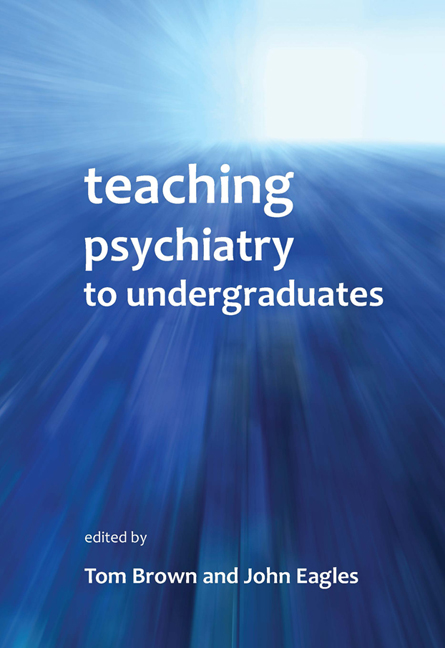Book contents
- Frontmatter
- Contents
- List of figures, tables and boxes
- List of contributors
- Preface
- Foreword
- 1 How do students learn?
- 2 Recent developments in undergraduate medical education
- 3 Undergraduate psychiatry teaching – the core curriculum
- 4 The organisation of undergraduate teaching
- 5 Assessment of undergraduates in psychiatry
- 6 Using computers to teach undergraduate psychiatry
- 7 How to give a lecture
- 8 How to do small-group teaching
- 9 Problem-based learning
- 10 Teaching trainee psychiatrists how to teach medical students: the Southampton model
- 11 Involving trainees in teaching
- 12 Involvement of service users in psychiatric education
- 13 Time-efficient clinical teaching
- 14 Intercalated degrees
- 15 Undergraduate experiences of psychiatry: a student view
- 16 Integration: teaching psychiatry with other specialties
- 17 Teaching the teachers in a cross-cultural setting: the Scotland–Malawi Mental Health Education Project
- 18 International undergraduate teaching
- 19 Teaching with simulated patients and role-play
- 20 Undergraduate medical education and recruitment to psychiatry
- 21 Choosing psychiatry: factors influencing career choice among foundation doctors in Scotland
- 22 Funding of the teaching of medical undergraduates
- 23 Dealing with students in difficulty
- 24 Training medical students to promote good mental health in secondary schools
- 25 Women in medicine
- Index
21 - Choosing psychiatry: factors influencing career choice among foundation doctors in Scotland
- Frontmatter
- Contents
- List of figures, tables and boxes
- List of contributors
- Preface
- Foreword
- 1 How do students learn?
- 2 Recent developments in undergraduate medical education
- 3 Undergraduate psychiatry teaching – the core curriculum
- 4 The organisation of undergraduate teaching
- 5 Assessment of undergraduates in psychiatry
- 6 Using computers to teach undergraduate psychiatry
- 7 How to give a lecture
- 8 How to do small-group teaching
- 9 Problem-based learning
- 10 Teaching trainee psychiatrists how to teach medical students: the Southampton model
- 11 Involving trainees in teaching
- 12 Involvement of service users in psychiatric education
- 13 Time-efficient clinical teaching
- 14 Intercalated degrees
- 15 Undergraduate experiences of psychiatry: a student view
- 16 Integration: teaching psychiatry with other specialties
- 17 Teaching the teachers in a cross-cultural setting: the Scotland–Malawi Mental Health Education Project
- 18 International undergraduate teaching
- 19 Teaching with simulated patients and role-play
- 20 Undergraduate medical education and recruitment to psychiatry
- 21 Choosing psychiatry: factors influencing career choice among foundation doctors in Scotland
- 22 Funding of the teaching of medical undergraduates
- 23 Dealing with students in difficulty
- 24 Training medical students to promote good mental health in secondary schools
- 25 Women in medicine
- Index
Summary
Introduction
Despite substantial change in undergraduate medical education over the past two or three decades, in terms of student demographics, teaching methods and curriculum content, this has had little effect on recruitment into psychiatry in the UK, the rate remaining consistently at 4–5% of British medical graduates (Goldacre et al, 2005).
It is well established that undergraduate experience is of primary importance in influencing career choice (see Chapter 20), but when and why medical students become dissuaded from choosing psychiatry, having been at worst neutral before admission to medical school (Maidment et al, 2003), has still to be elucidated. A number of studies (e.g. Malhi et al, 2002; Brown et al, 2007) suggest that several factors operate during the undergraduate years that may reduce the likelihood of a student choosing psychiatry as a career. However, few inferences can be drawn from these studies, as they either offer ‘expert opinion’ (i.e. views from within the profession) or are surveys overtly conducted by psychiatrists, which may have influenced respondents.
While undergraduate experience may shape the basis of career choice, postgraduate experience appears to act as an important modifying influence; traditionally, psychiatry gained recruits within the early postgraduate years, which suggests that the balance of influencing factors changes, perhaps owing to positive and negative practical work experiences, opportunity or personal circumstance (Goldacre & Lambert, 2000). This is partly reassuring,though concerns have been raised recently about the impact that the more streamlined specialist training scheme may have on psychiatric recruitment. On the one hand, limiting potential experience by requiring an earlier specialty choice may reduce postgraduate gain. Alternatively, foundation programmes could improve recruitment, through trainees working in specialties that they may not otherwise have considered as a career.
It is therefore important to establish which factors encourage and discourage trainees into and from psychiatry, when these become influential and whether foundation experience improves recruitment. Establishing these factors should help to guide changes within the undergraduate and early postgraduate years that are required to improve psychiatric recruitment.
- Type
- Chapter
- Information
- Teaching Psychiatry to Undergraduates , pp. 255 - 263Publisher: Royal College of PsychiatristsPrint publication year: 2011



